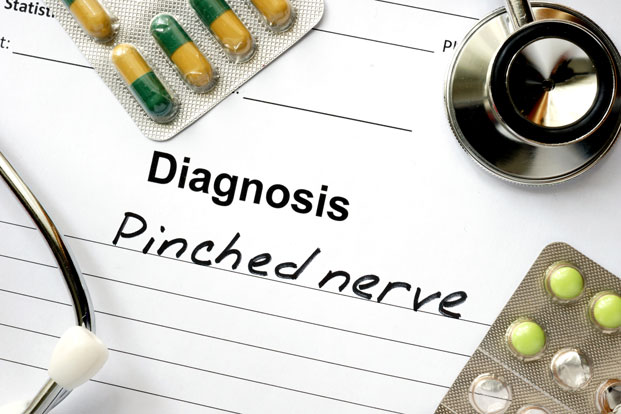It can happen in hips, backs, shoulders and more, and the pain can be debilitating. When bones, muscles, cartilage or tendons apply too much pressure to a surrounding nerve, it results in what’s called a “pinched nerve.”
It is a very painful condition (although tingling and numbness can also be present) and can happen because of injury, strains, poor posture, sports activities, repetitive work or simply a misalignment in the body, disrupting the nerve’s function.
Dealing with the Pain of a Pinched Nerve
Pinched nerves are bothersome and painful, but they don’t necessarily have to be permanently debilitating. Here are five solutions to preventing and dealing with them.
In cases in which pain is severe, nonsteroidal anti-inflammatory drugs (NSAIDs), including ibuprofen (Advil, Motrin IB, etc.) or naproxen (Aleve), are helpful in pain relief. In some instances, corticosteroid injections or oral medications can bring relief.
Where Pinched Nerves Occur
Pinched nerves are not limited to one area of the body. A pinched nerve in the wrist can cause a problem known as carpal tunnel syndrome. Similarly, a pinched nerve in the back may cause lower-body pain, or a herniated spinal disk may cause back problems.
The areas of the body most at risk of pinched nerves are the locations where there is little soft tissue to protect them. Nerves can be compressed between tendons, ligaments and bones, causing the nerve to react. Changes in the bones or discs in the spine (such as a tear, known as a herniated disk) can result in additional pressure on a delicate spinal nerve.
Most pinched nerves are temporary, though painful, conditions. Most people rest and perhaps apply heat to the area, using over-the-counter pain medications for some additional support. That usually relaxes the area enough so that things are back to normal in a few days. However, in more severe cases, surgery may be needed to help relieve pain.
Feeling the Pinch?
Most pinched nerves are accompanied by moderate to severe pain, and the pain may radiate from the nerve location to other areas. It may be accompanied by a numb feeling in the area, a pins-and-needles feeling known technically as paresthesia, a feeling that an extremity has “fallen asleep” and muscle weakness in the area.
Women are more likely than men to have certain pinched nerve conditions, like carpal tunnel syndrome. Accidents that cause bone spurs can stiffen certain areas and cause osteoarthritis, which can narrow the space of the spine, causing more pinched nerves. Rheumatoid arthritis can compress nerves in the joints, causing more problems, while thyroid disease sufferers can have a higher risk of carpal tunnel syndrome.
Those who are overweight or have diabetes are also at higher risk of compressing nerves, and pregnant women who gain weight can have nerve paths swell, causing more pinches. And there are certain jobs that require repetitive hand, shoulder, wrist or other movements, like assembly line work or factory jobs, increasing the chances of a pinched nerve.
Finally, genetics can play a role as well. Some people are just predisposed to the narrowing conditions that can cause nerves to be pinched.
Diagnosing a Pinched Nerve
Doctors will usually perform a complete physical exam to determine whether you have a pinched nerve. They may also ask for some additional tests. These include:
Surgery May Bring Relief
In certain cases, pinched nerve pain does not improve. In that event, surgery may be advised to move the nerve away from its pressure point. The problem’s location will determine the type of surgery recommended. Surgery may involve shaving bone spurs or removing herniated disks. In some cases, the carpal ligament is severed in the wrist.
Post-surgery, doctors may recommend strength and flexibility exercises to help with recovery. They typically recommend losing weight and eliminating the activities that may have led to the initial pinched nerve, like typing or chopping, at least for several weeks of recovery.
Keep in mind that pinched nerves are usually caused by stress in the region where the nerve was located. In most cases, rest is enough to restore the balance of the afflicted areas.

Leave a Reply